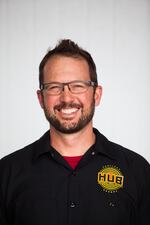A threatening spike in coronavirus cases led the governors of Washington and Oregon to place new restrictions on businesses and social gatherings.
For restaurants, the new rules in both states went into effect on Wednesday, including the new restrictions Oregon Gov. Kate Brown has called ”the freeze.”
But not all freezes are created equal.
“The way the regulations have fallen down have created two dramatically different models for us, really,” said Christian Ettinger, brewmaster and owner of Hopworks Urban Brewery. He has one location in Southeast Portland, one at the Portland International airport and one in East Vancouver (a north Portland location closed in October, a victim of declining pandemic revenue).

Hopworks founder Christian Ettinger
Matt Sutherland
They’re family-friendly establishments, the type of place you might see a group of buddies throwing back happy hour beers alongside a family, the kids munching french fries while the parents take the edge off.
But once the pandemic hit, his company went from 150 employees to seven overnight.
“I was the only full-time employee,” Ettinger said.
He was able to hire about half his staff back as restrictions eased in the spring and summer, but the most recent round of state guidelines has shrunk his restaurant staff back to a quarter of its pre-COVID-19 size.
Alfresco economics
The main difference today is his patio space in Vancouver. Washington regulations still allow him to serve food and drinks outdoors, while Oregon has mandated that all bars and restaurants do to-go service only. And while he said he lost 118 seats inside at his Vancouver pub, the 40 seats still open on the patio are a big deal.
“It makes a big difference in the number of people you can continue to employ and the amount of income you can generate,” Ettinger said. “It’s still not close to break even, but it helps.”
But Ettinger said the bigger challenge was a detail that existed before the most recent freeze went into effect: how the state regulated restaurant capacity.
Washington had permitted restaurants to operate at 50% capacity, while Oregon set hard caps on the number of diners each establishment could hold: initially 50, then it expanded to 100.
Ettinger said this makes sense for a smaller bar that might only have a limited number seats to begin with, but his sprawling Southeast Portland brewpub has space to seat roughly 300 people. That meant that even if he hits Oregon’s statewide cap, he was permitted to use significantly less of his available space than at his other business 10 miles north.
“Using percentages versus just blanket restriction numbers … that’s an architectural standard that’s easy to justify,” he said.
Cascadia Unity
Ettinger isn’t making the argument to reopen his business entirely.
“We should never put business in front of people’s welfare,” he said. “Covid and the science around this pandemic should drive all the decision making.”
And the science says dining indoors is still a bad idea: a recent study in the science journal Nature estimates that restaurants are four times more dangerous than gyms and coffee shops right now.
Rather, he’s hoping for a more unified plan forward for businesses like his that straddle the Columbia River.
“Cascadia shares an attitude and a bio-region,” he said. “I think if we could unite between Oregon and Washington and have similar rules that are fair and allow for as much employment and support small business as much as possible while minding the health of people, there’s a middle ground. We’re not there yet.”
Ettinger said his company is lucky to have a foot in the wholesale business, selling beer directly to consumers through grocery and convenience stores. He urges people to get out and support local businesses wherever they can, even if it means ordering in more than usual.
Still, he says 90% of his pubs’ pre-pandemic income came from dine-in service. With that many empty seats, he’s looking ahead to a cold winter.
“The model for restaurants relies on robust dine-in business,” Ettinger said. “Takeout-friendly businesses like fast food and stuff: they’re built for this. The restaurant industry, as you know, is not built for this.”
Listen to Ettinger’s conversation with OPB “Weekend Edition” Host John Notarianni using the audio player above.
